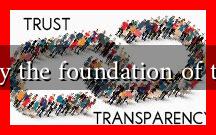-
Table of Contents
Is Transparency the Foundation of Trust in Society?
In an age where information is readily available and communication is instantaneous, the concept of transparency has emerged as a cornerstone of trust in society. From government institutions to corporate entities and interpersonal relationships, transparency plays a crucial role in fostering trust. This article explores the significance of transparency, its impact on trust, and how it shapes societal dynamics.
The Importance of Transparency
Transparency refers to the openness and clarity with which information is shared. It involves making processes, decisions, and data accessible to stakeholders. The importance of transparency can be summarized in the following points:
- Accountability: Transparency holds individuals and organizations accountable for their actions. When people know they are being observed, they are more likely to act responsibly.
- Informed Decision-Making: Access to information allows individuals to make informed choices, whether in voting, purchasing, or engaging in community activities.
- Enhanced Communication: Open channels of communication foster dialogue and understanding, reducing the likelihood of misunderstandings and conflicts.
Transparency in Government
Governments that prioritize transparency tend to enjoy higher levels of public trust. For instance, the Freedom of Information Act (FOIA) in the United States allows citizens to request access to government records, promoting accountability and openness. A study by the World Bank found that countries with higher transparency levels experience lower corruption rates and better governance outcomes.
One notable example is New Zealand, which has consistently ranked high in transparency and low in corruption. The country’s commitment to open government initiatives has led to increased public trust, as citizens feel more engaged and informed about governmental processes. According to Transparency International, New Zealand has maintained a Corruption Perceptions Index score of 87 out of 100, reflecting its strong commitment to transparency.
Corporate Transparency and Consumer Trust
In the corporate world, transparency is equally vital. Companies that are open about their practices, supply chains, and financial performance tend to build stronger relationships with consumers. A survey by Label Insight revealed that 94% of consumers are more likely to be loyal to a brand that offers complete transparency.
For example, Patagonia, an outdoor clothing brand, has built its reputation on transparency regarding its environmental practices. The company openly shares information about its supply chain, labor practices, and environmental impact, which has resonated with consumers who prioritize sustainability. This commitment to transparency has not only enhanced Patagonia’s brand loyalty but has also positioned it as a leader in corporate responsibility.
Transparency in Personal Relationships
Beyond institutions and corporations, transparency is essential in personal relationships. Open communication fosters trust between friends, family members, and partners. When individuals share their thoughts, feelings, and intentions honestly, it creates a foundation for mutual respect and understanding.
- Building Trust: Honest conversations about expectations and boundaries can strengthen relationships.
- Conflict Resolution: Transparency allows for addressing issues before they escalate into larger conflicts.
- Emotional Safety: When individuals feel safe to express themselves, it enhances emotional intimacy.
The Challenges of Achieving Transparency
While transparency is crucial for building trust, achieving it can be challenging. Some barriers include:
- Fear of Repercussions: Individuals and organizations may fear negative consequences for being transparent, leading to a culture of secrecy.
- Information Overload: In an era of information saturation, discerning what is relevant can be overwhelming for individuals.
- Privacy Concerns: Balancing transparency with the need for privacy can be a delicate task.
Conclusion
In conclusion, transparency is indeed a foundational element of trust in society. Whether in government, corporate settings, or personal relationships, openness and clarity foster accountability, informed decision-making, and enhanced communication. While challenges exist in achieving transparency, the benefits far outweigh the drawbacks. As society continues to evolve, embracing transparency will be essential for building trust and fostering a more engaged and informed populace.
For further reading on the importance of transparency in governance, you can visit Transparency International.

